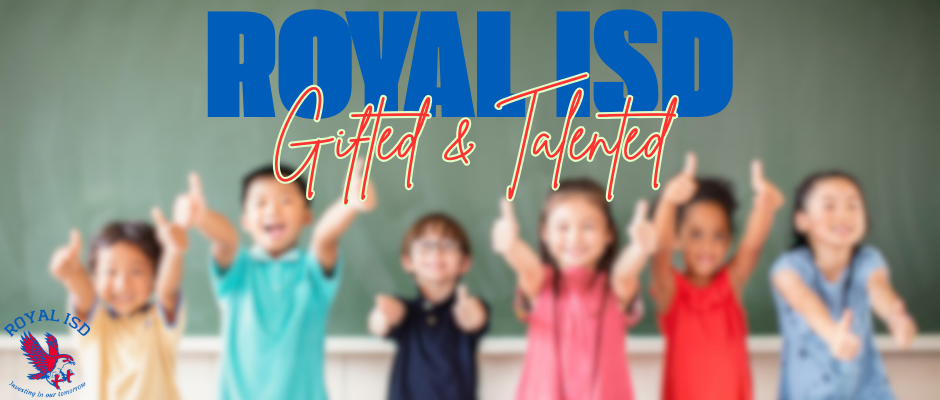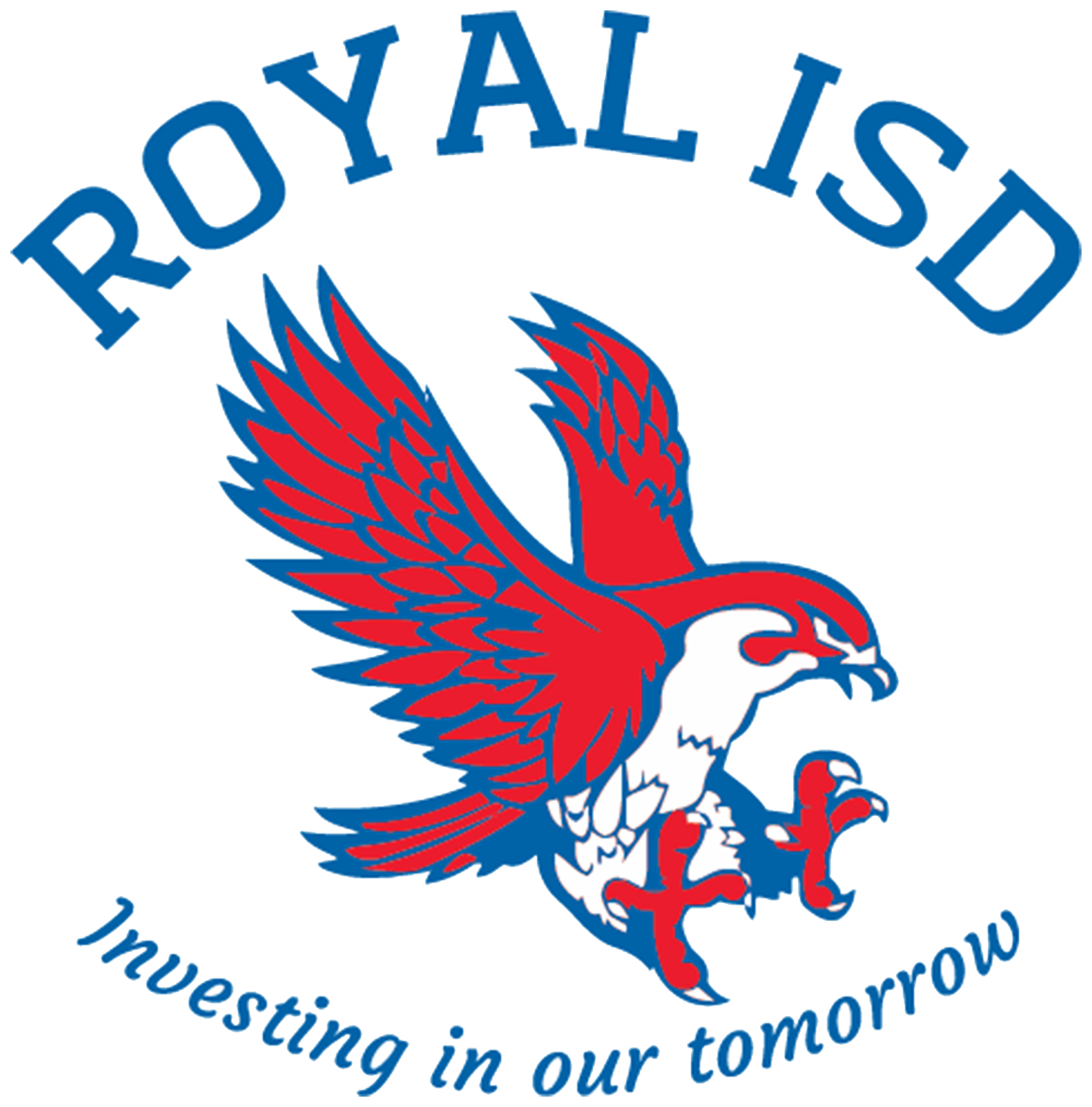Resources
GT Coordinators
Royal Early Childhood Center
Alicia Sharpe
asharpe@royal-isd.net
Royal Elementary School
Ms. Ashley Cook
acook@royal-isd.net
Royal Prairie Elementary School
Ms. Lauren Brown
labrown@royal-isd.net
Royal Junior High
Ms. Carolyn Conway
cconway@royal-isd.net
Royal STEM Academy
Holly Hayes
hhayes@royal-isd.net
Royal High School
Ms. Shalonda Dumas
sdumas@royal-isd.net
Royal Independent School District
Melissa Baker
mbaker@royal-isd.net

Gifted & Talented Program
2025-2026 Referrals
The 2025-2026 referral window for Gifted and Talented services begins November 3, 2025, and ends December 12, 2025. Any parent or community member who wishes to refer a student for Gifted/Talented services should complete the G/T Referral Form in either English or Spanish and return it to the student's Campus Gifted/Talented Coordinator by the end of the referral window. Please see the Gifted and Talented Policies and Procedures for a list of each campus GT Coordinator.
Goal for Services
Students who participate in services designed for gifted students will demonstrate skills in self-directed learning, thinking, research, and communication as evidenced by the development of innovative products and performances that are advanced in relation to students of similar age, experience, or environment and reflect individuality and creativity.
Purpose
The purpose of the Royal ISD Gifted and Talented program is to meet the learning needs of all gifted students through an academic acceleration model for the intellectually gifted.
Differentiation
A variety of strategies are employed in order to differentiate the curriculum and instruction to meet the individual need of gifted and talented students. Because of the traits, behaviors, and characteristics of these students, they learn in different ways and at a different pace than other students. Challenges are imperative for these students. A differentiated curriculum can provide those challenges that will address the gifted students’ learning styles.
Questioning Strategies
Advanced Acceleration with mastery of current curriculum
Flexible Skills Grouping
Curriculum Compacting
Learning Centers
Interest Groups
Independent Study / Projects
Real world problems
Open Ended Problems
Use of advanced / sophisticated resources
Student choices in learning
Challenging lessons
Critical thinking / Problem Solving / Advanced Thinking
Depth
A Longer period of time to study concept / content
Use of advanced vocabulary
Use of generalizations / broad based themes
Examination of unanswered questions
Exploration of an ethical issue or judgment
Examination of rules, principles, or laws
Complexity
Content / concept is studied over time (past, present, future)
Content / concept is approached from different or multiple perspectives, view points, or roles
Content / concept has interdisciplinary connections
Non examples of the content / concept are investigated within the theme or generalization
Description of Services
The Texas State Plan for the Education of Gifted/Talented Students requires schools to provide gifted and talented students with the opportunity to collaborate with others of similar ability, to work with classmates in a general setting, and to work independently.
ELEMENTARY (K-5):
Identified students at each grade level in grades K-5 are clustered to the extent possible in a regular classroom with teachers who have the state-mandated training in gifted education.
Students at the elementary level who participate in the Gifted/Talented program are actively engaged in academic studies with an emphasis on the following:
Critical and creative thinking skills, problem-solving skills, integrated curriculum studies in the four core academic areas, and projects involving independent research.
Academic projects are selected based on the individual interests of the students.
Students are expected to work both independently and in group situations.
Students produce advanced-level products and make presentations that are targeted to an audience outside the classroom.
Students are involved in leadership activities and offered out of school enrichment options.
JUNIOR HIGH (6-8):
Identified gifted and talented students are served in the Honors level or accelerated classes in the four academic content areas. Teachers of these courses have received the state-required gifted and talented training. Gifted and talented junior high school students will be expected to take Honors or accelerated courses whenever these courses are offered. These advanced classes contain students who have been identified as G/T as well as other high achieving students. All other students are mixed heterogeneously. The G/T students are given assignments that require them to work alone, with others, or as a class. Junior High students identified as G/T are expected to participate in UIL activities.
HIGH SCHOOL (9-12):
Identified gifted and talented students are served in the Honors and Advanced Placement (AP) courses in the four academic content areas. At the high school level, gifted and talented students may also enroll in dual enrollment and dual credit classes (such as OnRamps and Early College High School). Teachers of the Honors and AP courses have received the state-required gifted and talented training. Gifted and talented high school students will be expected to take Honors and/or Advanced Placement courses each school year. Other options for secondary students include enrollment in dual credit courses, participation in UIL academic activities, credits by examination, and Early College High School participation.
SCREENING AND ASSESSMENT
All referred students in grades 1-12 shall be assessed each spring. Referred kindergarten students shall be assessed in November–January for gifted/talented services to begin prior to March 1st. The assessment process shall ensure that students with special needs, cultural differences, economical disadvantages, and disabilities are given fair and equitable consideration for the gifted/talented program. The campus shall obtain written parent consent before testing or individual assessment is conducted as part of the identification process.
After parent permission has been obtained, all nominated students will be assessed using multiple measures, both qualitative and quantitative, to determine their aptitude, performance, and gifted/talented abilities. Measures will vary depending on the grade of the nominated student.
A student profile is used to identify those students who perform or show the potential for performing at remarkably high levels of accomplishment relative to their age, peers, experience, or environment. The profile will reflect a minimum of three (3) criteria used in the assessment. The criteria will be a combination of qualitative and quantitative instruments and may include, but is not limited to:
Nonverbal Abilities Test such as the Naglieri Nonverbal Ability Test (NNAT3) or another school abilities test as deemed appropriate for the student.
Achievement Test such as the Iowa Test of Basic Skills (ITBS); STAAR; EOC
Parent Survey/Checklist
Teacher Observation/Checklist
Test Scores: Teacher-made tests, benchmarking assessments, standardized tests (STAAR; EOC), iStation, DRA, etc.
Student work products and projects (planned experiences), teacher observations, student conferences
